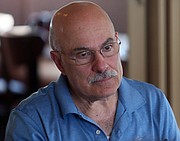Coffee, pancakes, and county politics
COEUR d’ALENE — Citizens and candidates talked county issues over pancakes and coffee Friday morning at the International House of Pancakes in Coeur d’Alene.
As he has done before in Athol, Bayview, Rathdrum, and Coeur d’Alene, Republican nominee for county commission Bill Brooks hosted the informal event to give people a chance to air their views on pressing county issues. Current county commissioner Chris Fillios and fellow Republican nominee for county commission Leslie Duncan were also present, along with about 20 Kootenai County residents.
Solid waste, county management, and sheriff’s deputy pay topped the items for discussion.
County resident Robert Norris broached the topic of a change in county management.
Despite a fiscal year 2019 budget of more than $94 million, the county doesn’t have a CEO or general manager. Norris opined that a professional could “find additional efficiency between departments.”
Brooks agreed the county should hire a CEO.
“My long-range plan is to eliminate my job,” Brooks explained.
Ideally, he said, the county could have seven part-time commissioners who get paid on a per-diem basis, and one full-time CEO whose salary could come from the elimination of the county’s three full-time commissioner salaries. Brooks said Kootenai County voters rejected such a streamlined, CEO-led form of county government in 2012 because the county didn’t do a good job of educating them on the issues at the time. If brought up again, he said, it would stand a chance to pass.
Fillios agreed on Brooks’ main points but disagreed on the proposal’s chances at the ballot box.
“If it is put to a vote again, it would be defeated again.”
Fillios agreed that Kootenai County’s blistering pace of growth was not well served by the board form of county government, which he said was created to serve small, agricultural communities. “It is not efficient” for the state’s largest, fastest-growing counties such as Kootenai, Ada, Canyon, and Twin Falls, Fillios said.
On the topic of transparency, Brooks suggested televising the county commission’s meetings and moving them to a larger room.
Norris asked if meetings could take place after normal business hours so more people could attend.
Fillios rejected the idea of later meetings, saying he was not willing to work all day and then stay late at night. He explained that he’s heard complaints after occasional evening public hearings that lasted until 9 or 10 p.m.
Also, he said it was difficult to deliberate at that late hour.
Duncan supported televising meetings and making them accessible for people to watch online at their convenience. However, she said that she had attended hundreds of county meetings over the past three years, and people rarely attended them.
“Meeting during the day is problematic sometimes, but when there is so much feedback about an issue they will move that meeting to the night,” she added.
Dr. Robert West, Kootenai County’s former coroner, asked if the county was getting money for housing other counties’ inmates.
On the contrary, said Fillios, Kootenai County is shipping some of its own inmates to other facilities. Undersheriff Dan Mattos said approximately 439 inmates resided in the county jail at present, with 60 to 70 being held elsewhere.
“We don’t have room for our own, let alone anyone else’s,” Mattos said.
West also asked about the state of solid waste in the county.
Laureen Chaffin, the county’s principal planner for solid waste, explained that the county’s landfills are in good shape to handle the growing waste stream from its residents.
“What is currently permitted will last until 2042,” she said, and the county has also purchased land south of Fighting Creek that will give another 60 years of lifespan there.
On the topic of pay for county law enforcement, Duncan cited the Idaho Republican Party platform, which states that public employees should be paid wages comparable to employees in the private sector. She spent a decade in law enforcement, she said, and money is not the reason why law enforcement officers do their jobs.
However, argued Mattos, the county needs to be competitive with other agencies that lure away highly-trained deputies.
Brooks said the cycle of recruiting, training, and then losing deputies to the cities of Coeur d’Alene and Spokane is bad for Kootenai County.
County employees in general are underpaid 10-17 percent, Fillios said. He added that studies on the issue should include the locales where Kootenai County is losing employees, and not just small agricultural counties.
Twin Lakes resident Alan Callanan said, “I’m for the sheriffs to get paid more.”
He said he knew law enforcement in his native California.
Linda Callanan explained that it’s worthwhile to pay employees more up front and not lose them.
“I know what it’s like to train and lose employees to higher-paying facilities,” the retired nurse said.
The couple found the breakfast discussions “informative.”
Brooks wrapped up the civil, hourlong, get-together with gratitude to those who participated.
“We’re not going to solve it, but this is how it begins,” he said.





